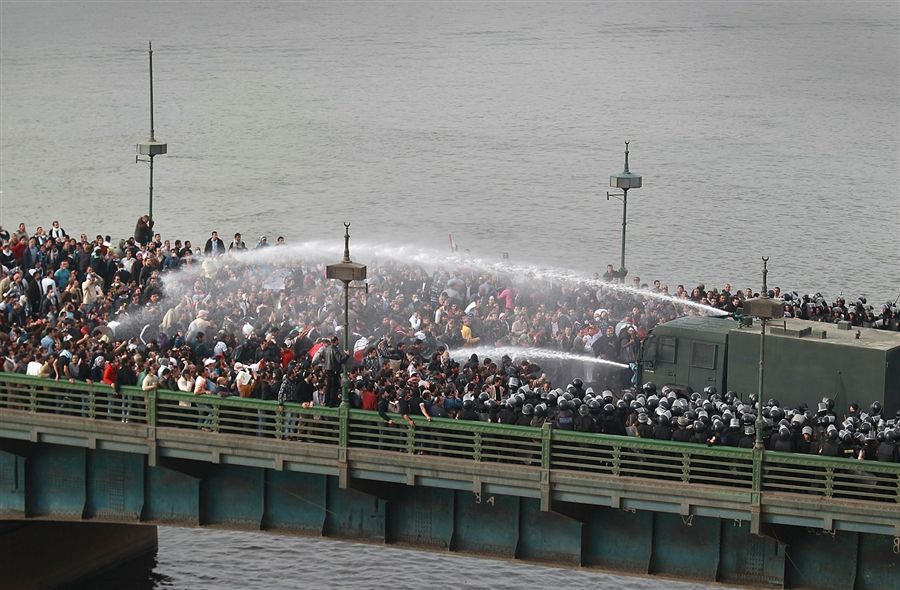By Tom Perry / Reuters
CAIRO: The race for the Egyptian presidency has been redefined by the disqualification of Hosni Mubarak’s spy chief and prominent Islamists, including a Muslim Brotherhood candidate and a popular Salafi cleric.
The developments add to the turbulence of a transition to democracy that has been punctuated by spasms of violence and political rivalries between once-banned Islamists, secular-minded reformists and remnants of the Mubarak order that was overthrown in last year’s popular uprising.
Winners from the drama include former Arab League chief Amr Moussa and moderate Islamist Abdel Moneim Abol Fotoh. Both have spent longer on the campaign trail than most but were eclipsed by late comers to the race who were disqualified on Tuesday.
The losers include the Brotherhood, the biggest party in parliament which decided at the last moment to throw its hat into the ring but whose chances appear to have been undermined by the disqualification of its first choice candidate.
Khairat Al-Shater, a millionaire businessman and the deputy Brotherhood leader, is now out of the picture, disqualified on the grounds of a criminal conviction passed down during Mubarak’s rule, when the group was banned.
In his place, the group will field Mohamed Morsi, head of its political party who had filed the official paperwork to run just in case Al-Shater was disqualified.
“The group and party announce they are continuing in the competition for the post of the head state with their candidate Dr. Mohamed Morsi,” the Brotherhood said in a statement.
With the Brotherhood’s well-organized electoral machine behind him, Morsi immediately becomes a contender in the election that gets underway in May and is expected to go to a run-off in June.
But political analysts see the 60-year old engineer as a much weaker candidate than Al-Shater.
“Morsi was the backup for a reason,” said Shadi Hamid, an expert on the Brotherhood. “Al-Shater was the only one among them who looked remotely presidential. It’s a big blow to the Brotherhood.”
Al-Shater had been stressing his Islamist credentials on his few days on the campaign trail, striking a tone that could have galvanized support among the ultra-orthodox Salafi movement that also did well in the legislative election.
A Salafi preacher, Hazem Salah Abu Ismail, had hoped the same constituency would launch him into the presidency. But he too is now out of the vote, disqualified because his mother held a US passport – something he strongly denies.
Abu Ismail’s campaign had festooned Egypt with his posters, generating both broad name recognition and questions over where his finance was coming from. Rivals alleged it may have been from like-minded conservatives in the Gulf.
Hamid said: “What made Shater a promising candidate was that he could unite the Islamist factions, he could bring the Salafis on board. With Mursi it will be more challenging but it is still possible.”
Moussa to launch manifesto
With a Morsi candidacy, there are also greater chances of Brotherhood internal discipline breaking down and some of its votes going to Abol Fotoh. He was expelled from the group last year when he decided to launch his own presidential bid.
“He will get many of the votes that were going to go to Al-Shater and Abu Ismail as many will not be convinced by Morsi, who has been away from the Egyptian media in the last period,” said Nabil Abdel Fattah, a political scientist.
Abol Fotoh, 60, was part of a moderate reform wing in the Brotherhood until his expulsion. His candidacy has won the approval of Sheikh Yousef Al-Qaradawi, an Egyptian cleric based in Qatar who is influential in the Brotherhood and beyond.
A medical doctor, Abol Fotoh has also started to win support outside the Islamist movement among secular-minded Egyptians looking for someone committed to democratic reform.
Moussa, who describes himself as a liberal nationalist, is also likely to win votes among secular-minded Egyptians worried about the dramatic gains made by Islamists in the year since Mubarak was toppled.
The 75-year old, a former Egyptian foreign minister, has also move squarely back to the heart of the race thanks to Tuesday’s disqualifications.
Moussa’s campaign had to contend with the last-minute entry to the race of Omar Suleiman, Mubarak former intelligence chief who seemed likely to erode some of Moussa’s support base.
Moussa is due to launch his campaign manifesto on Wednesday in a slum on the outskirts of Cairo.
“The disqualifications…are certainly to the benefit of Amr Moussa and Abdul Moneim Abol Fotoh who were listed as front-runners before the sudden and last minute entrances of Suleiman and shatter to the race,” said Mustapha Al-Sayyid, a political science professor at Cairo University. –Additional reporting by Yasmine Saleh


